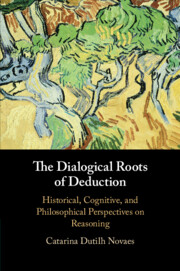 The Dialogical Roots of Deduction
The Dialogical Roots of Deduction Book contents
- The Dialogical Roots of Deduction
- The Dialogical Roots of Deduction
- Copyright page
- Contents
- Figures
- Preface
- Part I The Philosophy of Deduction
- 1 The Trouble with Deduction
- 2 Back to the Roots of Deduction
- 3 The Prover–Skeptic Dialogues
- 4 Deduction as a Dialogical Notion
- Part II The History of Deduction
- Part III Deduction and Cognition
- References
- Index
4 - Deduction as a Dialogical Notion
from Part I - The Philosophy of Deduction
Published online by Cambridge University Press: 10 December 2020
- The Dialogical Roots of Deduction
- The Dialogical Roots of Deduction
- Copyright page
- Contents
- Figures
- Preface
- Part I The Philosophy of Deduction
- 1 The Trouble with Deduction
- 2 Back to the Roots of Deduction
- 3 The Prover–Skeptic Dialogues
- 4 Deduction as a Dialogical Notion
- Part II The History of Deduction
- Part III Deduction and Cognition
- References
- Index
Summary
This chapter presents a dialogical rationale based on the Prover–Skeptic model for the three main features of deduction identified in Chapter 1: necessary truth-preservation, perspicuity, and belief-bracketing. Moreover, it addresses four important ongoing debates in the philosophy of logic: the normativity of logic, logical pluralism, logical paradoxes, and logical consequence. It is shown that the Prover–Skeptic model provides a promising vantage point to address the questions raised in these debates.
Keywords
- Type
- Chapter
- Information
- The Dialogical Roots of DeductionHistorical, Cognitive, and Philosophical Perspectives on Reasoning, pp. 61 - 84Publisher: Cambridge University PressPrint publication year: 2020
